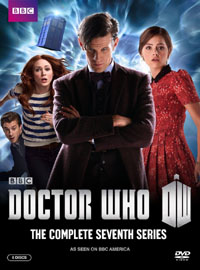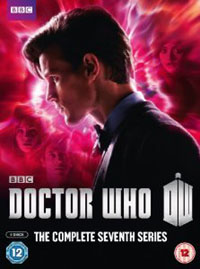DVD Extras for this story on the 15-episode box sets include:
Despite this story having all the personal-vendetta shoot-out mentality of a Western, the real issues of the piece center around war criminal justice and, without quite calling a spade a spade in the dialogue, capitol punishment for same. In this arena, we get some very diverse characterization and lots of cracking good dialogue exploring the issues and options from many angles. There are tons of really good quotes I could be using from all over the episode, and I don't think I'll ever get all of the good ones onto this page - there are just too many. But while the debates have it all, it is action that remains decisive, and in this case disappointing. The story cleverly starts out with a bit of mystery and misdirection, and is enjoyable during these opening segments. There's also an obvious threat from a shady cyborg, who gives the usual Western an appropriate sci-fi twist, and provides the story opportunities for movement and action. His ability to teleport is a nice touch, as is his habit of using it to jump no farther than he can see each time - quite tactically sound and reasonable. But once the Doctor's investigation has revealed all the hidden backstories, the real dilemma is upon them. Should the village give up their war criminal friend to save themselves, or continue to try to protect him? Everyone has a slightly different opinion or take, bringing up good points and interpreting the satisfaction of their consciences in a different way. As all this ensued, I found myself really liking the sheriff Isaac and his approach to the situation the most. He embodies the kind of calm, assertive energy recommended by Dog Whisperer Cesar Millan, he is keen and skilled at resolving conflict with sensible persuasion instead of his gun, and his overall philosophy is rooted in the 4th density concept of staying grounded in the present moment rather than getting lost in the past. Thus, he quickly becomes the stand-out role-model character for this adventure. Only after the credits rolled did I realize that Farscape lead actor Ben Browder had been playing him, providing me another reason for thoroughly enjoying him. Browder is a welcome asset to this cast, and successfully melts into the role via a slightly different look.
"See, this is what happens when you travel alone for too long."The story's first shot in its own foot is the action end result of the first big open debate. Plainly, the Doctor is completely wrong to grab surgeon Kahler-Jex and drag him outside the town's protective border, a move that ultimately results in the dire permanent loss of Sheriff Isaac before the episode is half over. We can understand the Doctor's anger here, and the fact that he might just respond to Jex's bizarre repeated taunts with some explosive force of his own. Fine. Shouting back at Jex and rattling him up in the jailhouse would have been reasonable outcomes here. But the Doctor is going too far out of character to maintain this state long enough to drag Jex all the way across town, put him outside the circle, and continue to maintain this stance until Amy equally goes out of character to put a gun to his head to change his mind. Plainly, the story tanks during this sequence, because I can no longer root for the activities of the regular characters.The Doctor is basically endorsing capitol punishment here, and I disagree 100% with that course in this case. I can think of only two worthy reasons for capitol punishment to be considered. One is if the accused remains a threat to society while still alive. Clearly Jex is not about to start up his experiments again anytime soon - he feels his guilt and has every motivation to steer as far clear from that kind of path as possible. The only other excuse for capitol punishment is if he would be a burden on society should they keep him alive. Jex is clearly helping the town by providing heat, electricity, and medicine far beyond anything otherwise offered in their time. By contrast, the cyborg Gunslinger is threatening this society directly, even though he does arbitrarily change his mind about it several times depending on his own level of patience. Who is he to point an accusing finger at Jex, considering he was just as much a participant in war criminal activity in the past, but worse is still engaged in war criminal activity in the present. It is primarily the Gunslinger who needs to be dealt with, by being disarmed at minimum, and probably jailed as well. If the Doctor wants to set himself a worthy goal, that would be it. Of course, it's another matter if Jex decides to sacrifice himself to the Gunslinger, partly out of past guilt and/or partly out of concern that the townspeople should not come to any harm. But that's Jex's decision, not the Doctor's, and the Doctor can't win any points for trying to take that decision upon himself. Granted, there's a weird dynamic between the two during these middle beats, as though Jex is too cowardly to perform the sacrifice himself, and thus pretends to be arrogant about his past to taunt the Doctor into performing that choice for him. It's Jex's attempt to manipulate, and it does make the blood boil, but a good Doctor should be strong enough to rise above manipulation before it goes to the lengthy extremes seen here.
"Don't you see? Violence doesn't end violence. It extends it."To be fair, the Doctor does come around to a better way of thinking eventually, but meanwhile the cost was too high, and I find it hard to believe that 1200 years into his life, considering all the stories we've seen and heard about, this wasn't all far more obvious to him by now. The story eventually comes up with great sentiments, in that violence only perpetuates the chain of injustice; it doesn't end it. I also like Amy's line of "See, this is what happens when you travel alone," which still has a place during emotional debates with more tempered action.
The Rabbit That Layed an EggThe Doctor finally aligns himself with good principles when he decides to protect everyone, including and especially Jex, from the Gunslinger. Finally there was action I could once more invest in, while still in suspense as to exactly what rabbit he would pull out of his hat to defeat today's villain. I got invested, and I wanted the Doctor back as proper hero.Then the story shot itself in the foot again. Jex chose NOW to sacrifice himself and protect the town. Okay, that's a fair choice, true enough for the guest characters and situation. But it does have the side-effect of making the Doctor look like a dufus once again, unable to adequately save the lives that he sets out to save. This just isn't his day. Adding insult to injury, the cyborg not only gets off scot free, but also gets promoted to sheriff. While I'm not one to insist on punishment, neither would I trust this walking killing machine who literally has a few proven screws loose and demonstrates some very dangerous mood swings. I'll sooner have Isaac as sheriff any day.
Mixed TonesSomehow the tone of this show is also somewhat "off" as well, if you can say that regarding the sheer obscurity of a Western/Sci-fi hybrid.
It's almost as if Doctor Who's European makers become so enamoured with the "Western" concept that it overpowers their objectivity towards the subject matter. It's like a feel-good, moral, lyrical coda is being artificially manufactured at the last minute, when in fact, good people have died, bad people still walk freely amongst the living characters, and it is unclear whether this outcome was made better or worse for having the Doctor and friends present and involved during the adventure. As an audience member I don't know if I want to feel good about the ending as the credits roll. Perhaps "The Gunfighters" flopped primarily from this same core reason in larger doses. Our comparison of the two adventures wouldn't be complete without mentioning how well William Hartnell's Doctor shone during his Western adventure. He also found himself mistaken for a wanted man, expected to participate in shootouts, and unexpectedly made an official member of the law with many lives to protect. He met these challenges without ever touching a gun, or sonic screwdriver for that matter, using his energy and ability to convince to defuse tense situations. And he was thoroughly charming from beginning to end, no matter how badly the rest of the production fell down around him. Matt Smith should well be envious. Only Ben Browder from this tale manages to be in Hartnell's league.
International Titles:Deutsch: "Wilder Westen"Magyar: "Egy város amit Mercy-nek hívtak"Français: "La Ville de la miséricorde"Русский: "Город под названием Милосердие"Italiano: "Una città di nome Mercy"This story has become available on DVD and Blu-ray.
This story is also available in a 5-episode volume with minimal extra features. Click on the Amazon symbol for the location nearest you for pricing and availability:
Comments on this article are welcome. You may contact the author from this page:
|
|||||||||||||||||||||||||||||||||||||||||||||||||||||||||||














